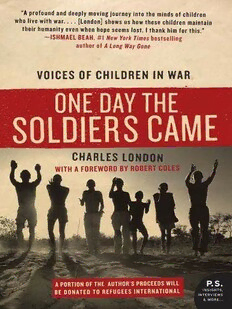
One Day the Soldiers Came PDF
02009·1.653 MB·English
Most books are stored in the elastic cloud where traffic is expensive. For this reason, we have a limit on daily download.
Preview One Day the Soldiers Came
Description:
From Publishers Weekly London, working with the nonprofit organization Refugees International, interviewed child soldiers and other young people affected by ethnic conflict in Africa, Burma and the Balkans to bring their plight to the attention of his fellow Americans. The narrative that emerges is a fine accomplishment, tying together the horrific stories of countless children against a merciless landscape of undersupplied refugee camps, belligerent authority figures and the constant threat of renewed violence. London tells of children forced into prostitution and military service, Burmese refugees unable to leave their dreary Bangkok apartments for fear of deportation and other tragic consequences of conflict; the stories are chilling and London is an able interviewer, getting children to open up by joining their soccer games and getting them to draw pictures. London began his project at age 21, and has a neophyte's penchant for self-regard and melodrama ("She is looking though her life, to some place else, some future bliss that is forever out of reach"); letting the stories speak for themselves would have bolstered their resonance. Regardless, this is a moving and important account of war's youngest victims in a region that too rarely enters the American consciousness. Copyright © Reed Business Information, a division of Reed Elsevier Inc. All rights reserved. From Booklist Today there are an estimated 300,000 child soldiers around the globe. American college student London has spoken with some of them, as well as with young war refugees in East Africa, Thailand, and the Balkans about their suffering both as targets of violence and as combatants. In eastern Congo, Xavier, 14, plays soccer in flip-flops: How many people has he killed? Karl from Kosovo, who saw his father gunned down, says, I probably won't live to be a grown-up. Patience, 14, from southern Sudan, has been raped repeatedly. Exiled in Thailand, Nicholas, 13, from Burma, has seen crucifixions, executions, abductions. London weaves together these stark individual narratives with the statistics and reports from international refugee organizations. But it is his passionate personal engagement that will get readers thinking about elemental issues, especially when he stops himself from dangerous, ridiculous, greeting-card idealization and confronts the truth: the image of childhood innocence is for the wealthy and the safe. Rochman, Hazel
See more
The list of books you might like
Most books are stored in the elastic cloud where traffic is expensive. For this reason, we have a limit on daily download.
